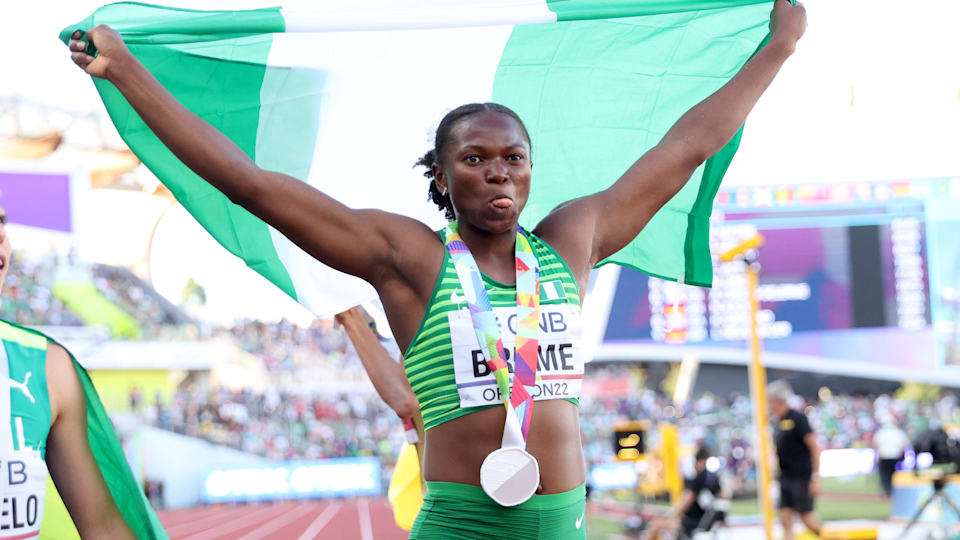
Ese Brume has grown in stature since she announced herself as a prodigious young talent at the Glasgow 2014 Commonwealth Games.
At 18, she landed her first major long jump title in Scotland before adding the African title weeks later.
Since her stellar international athletics debut eight years ago, Brume has collected medals at every major championship.
Brume came full circle in 2022, reclaiming the Commonwealth Games title she won in 2014 and setting a new championship record of 7.00m in the process.
"This is one thing I really wanted, to get the Games record," Brume told the BBC.
"This is special for me because it shows consistency. It shows the hard work of all those that have supported me and my coach, who has been backing me up.
"Sometimes it's about how you're able to show that what you're doing is not a fluke."
Her victory in Birmingham came just two weeks after she won the World Championship silver medal in Eugene, Oregon.
Having claimed bronze at last year's Tokyo 2020 Olympic Games, Brume has proved beyond doubt that she is one of world's finest long jumpers.
Brume's path to becoming Africa's long-jump queen
Brume's performances over the last three years saw her move out of the shadows of legendary Nigerian athletes to claim the mantle as Africa's undisputed long-jump queen.
By the end of 2018, she had won three consecutive African titles and Commonwealth Games gold, but those achievements did little to satisfy her appetite for greater honours.
And since 2019, she has hit a rich vein of form, claiming an African record, Olympic bronze, and bronze and silver medals at the World Championships in 2019 and 2022 respectively.
That bronze in Tokyo came five years after a promising Olympic debut in Rio 2016 where she finished fifth with a best jump of 6.81m despite a niggling knee injury.
"The Rio Olympics taught me that you should never look down on yourself and stick to what you believe in," she told World Athletics.
"I told myself if I'm able to make it to the final with one leg, I should be able to make the podium on two legs."
Making regular visits to the podium
Narrowly missing out on a podium at the global showpiece in Brazil spurred the young talent on, and she finally made the breakthrough three years later at the 2019 World Championships in Doha.
Brume led the competition from the first jump and extended that advantage in round two, but was ultimately relegated to third as German sensation Malaika Mihambo took gold.
"To win a bronze medal at the World Championships in 2019 gave me a lot of confidence that, 'OK, so I can actually compete with the top athletes in the world'," Brume said.
"I could actually do better still because that wasn't my best, you know, so it made me believe that I could get better. And so far, I have been working with that mindset, and it's helping me, and I can see a lot of improvement."
Brume highlighted her class in the build-up to the Tokyo 2020 Olympic Games (in 2021) when she jumped an African record jump of 7.17m in Chula Vista, California.
That mark was previously held by compatriot Chioma Ajunwa whose 7.12m in the first round of the final at Atlanta 1996 saw her claim Nigeria's first individual Olympic gold medal.
"It's a huge achievement for me and my coach. It was a surprise for us at first and, you know, it was something that we didn't expect to happen at that moment. It just happened." Ese Brume speaking to Olympics.com in October 2021
Looking to break the cycle
The sequence of events where Brume leads only to see Mihambo take victory has become all too familiar for the Nigerian star, happening again at the Tokyo 2020 Olympic Games and World Championships.
But Brume still managed to find her way onto the podium, winning bronze in Tokyo and becoming the third Nigerian woman to win a medal at the Olympics.
At this year's World Championships, Brume was the first athlete to go beyond seven metres with 7.02m in round three.
But the German took the lead in the fourth round with 7.09m before putting the seal on a successful title defence with 7.12m on her final attempt.
Brume is just two years Mihambo's junior at 26, but the strides she has made in recent years suggest she is on the cusp of turning bronze and silver into gold.
Symbols of female strength
Brume's silver helped make it a true red-letter day for Nigerian women in athletics.
Her compatriot and long-time friend Tobi Amusan became Nigeria's first world champion in athletics, breaking the world record in the 100m hurdles on her way to taking gold.
"Tobi Amusan is my best friend, everybody knows," Brume told World Athletics. "It was amazing for us because this is what we are trained for. She deserves it so much.
"Last championships, we just got one medal. Now we are getting out with two medals," she said. "It is a wonderful night for Nigeria, for all of us."
The duo captured the imagination as they shared a warm embrace with Nigerian flags draped around their shoulders — a symbol of the rise of two of the West African nation's biggest track and field stars.
The image of two young women riding the crest of the wave tied in with Brume's vision of being a role model for girls.
"I want to make young girls believe that all things are possible," Brume told Olympics.com last October. "You know they can do exactly or even better than what I'm doing right now."
"I'm not any super girl from one unique place. No, I'm a local girl from Ughelli. So if this local girl can do it, can come this far from nothing to become something, then you also can do it."
